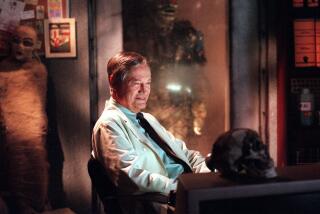Column: Billionaire Kirk Kerkorian destroyed MGM. Why was he honored at the Oscars?
- Share via
Jaws must have dropped in the film-buff community during the “In Memoriam” segment of Sunday’s Oscars telecast when, among the nearly 50 departed actors, writers, directors, and others who made real contributions to the movies, the name and image of Kirk Kerkorian popped up.
Certainly it struck film commentator Farran Nehme, who blogs as Self-Styled Siren, as amiss. Within minutes, she had tweeted: “Including Kirk Kerkorian in a Hollywood film tribute montage is like including a Visigoth in a tribute to Rome.”
She’s right. Kerkorian, identified in the montage merely as an “executive,” was a billionaire whose ownership of MGM ended in the demise of the storied studio as a major factor in Hollywood. Peter Bart, who served under Kerkorian in the 1980s, described him in his book “Fade Out: The Calamitous Final Days of MGM,” as “a savvy Las Vegas game player” who exploited the studio “to serve his personal objectives. The end result: Kerkorian emerged a billionaire. His companies emerged in shambles.”
The inclusion of Kerkorian in this year’s video farewell to movie figures underscores Hollywood’s chronic inability to properly value its own history. While Kerkorian got a mention in the montage, for instance, left out was veteran character actor Abe Vigoda, who died Jan. 26 at 94, and left an indelible imprint on audiences as the doomed Corleone henchman Sal Tessio in “The Godfather.” (“Tom, can you get me off the hook? For old times’ sake?”)
(Kerkorian) transformed corporate demolition into a high art.
— Former MGM executive Peter Bart
Kerkorian, who died June 15 at the age of 98, seemed obsessed with the MGM name and its trademark lion, if not with the studio’s actual achievements. A man who seemed to appreciate doing a deal more than creating something lasting out of the transaction, he bought and sold the studio three times. As his obituary in The Times observed, “His ownership of the studio was most notable for selling prized assets, including the historic studio lot in Culver City” and the studio’s huge library, which ended up in the hands of Ted Turner.
After Kerkorian’s death, Nehme assembled a few pointers to his destructive activities in Hollywood. In 1970, he had hired James T. Aubrey as MGM’s president. Aubrey, who as head of CBS Television had created “The Beverly Hillbillies” among other markers of America’s cultural decline, “began to dispose of all that had made MGM the greatest and most valuable studio.” In a massive auction that year, Aubrey disposed of the studio’s costumes and props -- furniture, autos, trolleys, even the showboat from the the classic MGM musical of the same name. (Some of the artifacts were saved by Debbie Reynolds, who prowled the auction floor snapping up valuable properties to launch her own collection.)
Kerkorian, according to Bart, “transformed corporate demolition into a high art,” becoming in the eyes of many in the film community, a “one-man wrecking crew.” He squeezed the studio for lavish dividend payments to help finance his real-estate ventures, including enormous Las Vegas casinos, built under the ownership of his corporation, MGM Grand (now MGM Resorts International). Kerkorian’s approach to Vegas was grandiose: Three of his casinos in succession -- ultimately the MGM Grand itself -- held the title of world’s largest hotel.
Aubrey razed two MGM back lots and plotted to sell the real estate to developers. Aubrey, reported historian Hugh Fordin, “ordered the music department’s library burned, with the exception of one score for every film retained; out-takes, prerecordings, music tracks and the enormous stock-footage library also went. The vast script library was about to go up in flames, but was stopped by someone who cared, and they were sent to the USC library.”
Keep up to date with Michael Hiltzik. Follow @hiltzikm on Twitter, see our Facebook page, or email [email protected]
More to Read
Inside the business of entertainment
The Wide Shot brings you news, analysis and insights on everything from streaming wars to production — and what it all means for the future.
You may occasionally receive promotional content from the Los Angeles Times.










